What does it mean to be adopted? The definition is “to take by choice into a relationship; especially as one’s own child.” Many adopted children will tell you that they feel special because their parents made the choice to bring them into their family. Yet society sometimes seeks to expose our differences rather than embrace our similarities. Does it really matter how you got into your family, or just that you are a family? The answer to this question is as personal and unique as your fingerprint. Whether you were adopted or love someone who was adopted, everyone has his or her own experience and story to tell – and we should listen.
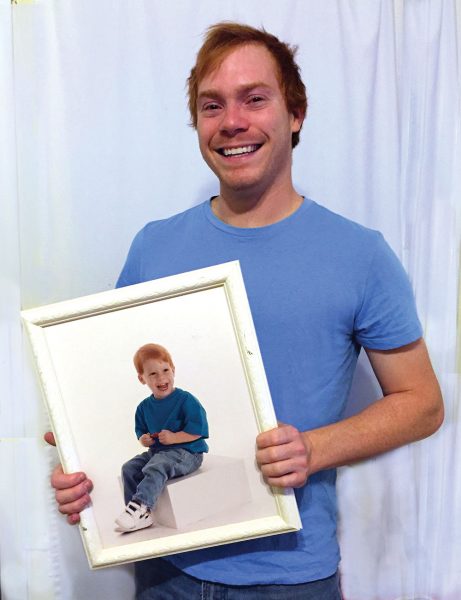

Matt Kacyn shown here at ages 3 and 25, attended Vanderbilt University, and currently plans to return to school to obtain a bachelor’s degree in elementary education. Photo by Tiara Lavitt
Looking back, by Matt Kacyn, age 25
I don’t really ever remember not knowing I was adopted. I was adopted at birth by a couple who already had one 3-year-old son. My adoptive father passed away from a sudden heart attack before my first birthday. My mom was suddenly alone, raising my older brother and I. She met the man I call my true father when I was 2 years old and they got married soon after. I no longer was the only person acclimating to a new family, as my brother and I now gained three new siblings from my dad’s first marriage.
Any of my siblings could tell you that our parents loved all of us very much. They did a great job of explaining that although we created our family in a unique way; they loved each of us equally. I got along well with my siblings. Any difficulties we had getting used to each other were very short lived and I don’t remember it ever causing issues in our relationships. Perhaps having a blended family took away from any isolation I could have felt for being adopted.
It has never mattered to me who gave birth to me. My parents are the two people who took me into their family and chose to raise me as their child. I think all of my siblings feel the same way – that biology does not determine family; love determines family. I couldn’t imagine growing up with anyone else.
I remember clearly as a child the idea that my parents chose me. They went through many pictures and files and met moms and many children. Then chose me! Having been adopted, it is interesting that I have never thought much about it. It never occurred to me that I have a unique perspective that affects my beliefs about adoption. There are so many different aspects: my parents, fitting into family, childhood bullying, birth parents, nature vs nurture, etc. The word “adoption” can have many different stigmas attached to it.
Adoption was one of the things I was bullied for as a kid – having red hair being the other main one. I learned at a very young age to take a logical approach to dealing with bullying. Being made fun of for the color of my hair or the fact that my parents chose me instead of giving birth to me meant nothing, but I would still get really offended by these insults. I would come home crying about being adopted. People often don’t even realize how insensitive they are being. I was young and naïve enough to believe that some people have the idea that being adopted somehow makes you less loved. This is the worst stigma that surrounds adoption. It is appalling how many people have this view.
I feel that adoption has no impact on the love a parent can feel for their children. This led me to realize that most things said in an attempt to offend me weren’t inherently offensive, but just perceived to be offensive. I may have had different difficulties being an adopted child, but every one of us has unique experiences and I wouldn’t say the adoption had much to do with mine. After all, it’s all I knew.
Adoptive parents go through a long, strenuous process with the sole purpose of having a child and loving that child. Foremost, I think any consideration of raising a child is a massive decision and shouldn’t be done without extensive thought. I expect that teaching a child how to live and how to look at life is one of the most difficult and exciting things a person can do. It can be harder for parents to deal with adopted children compared to biological ones, solely because of society’s views. This isn’t to say that adopted children are innately more difficult, but that the perception of adoption itself makes it so. There are lots of questions that arise, which prove the need for countless adoptive parenting books. Children’s books are also a great way to help the child process and understand peer reactions. For any advice regarding parenting I would tell you to go to those sources and a local support group too.
I know that explaining adoption to a child is a big worry for parents, but my parents did a great job telling me. There wasn’t just one conversation, but a lifetime of openness and caring. It’s not about knowing the right thing to say and do – sometimes it’s just a feeling. As long as it’s clear that you love your child, that’s really the only important message.
My mother was adopted up a generation, by Tami Graham
Mom was standing at the kitchen sink with a dishtowel draped over her shoulder, looking out a window in deep thought as I have seen her do so many times. “Mom,” I said, “I have to do a homework project about a family tree and I need your help.” She looked a bit startled when I asked her; like a deer in headlights. The time had come for her to explain a few things.
“I am happy to help, but I must tell you there are parts we may not know,” she said with tears in her eyes. “My birth mother left me and my older sister when we were very young, and since my dad was serving in the Navy, my grandparents took us girls in. Soon we became very attached to them. My father decided to let his parents adopt us, since he was away for so long.”
Now I was the one with the blank stare, trying to decipher what she had just said. She tried to explain it to me with words, but I could only grasp it once she drew it. She drew her grandparents, her parents, and then herself. Then, as if she was a piece on a gameboard, she moved the sketch of herself up a generation, illustrating that it was her grandparents that raised her.
Then I asked the first of many tough questions. “Are you saying that the man that I call ‘Uncle Bill’ is not actually your much-older brother, he’s really your father?
I was trying to wrap my brain around all of this new information. The family members that I had referred to as cousins, aunts, uncles and grandparents were now all mixed up, and my head began to swirl with the idea of presenting this information as a school project. I had already felt like I didn’t fit in and this was just another way for everyone to see me as “different.” I decided to use only my father’s family tree instead. I remember thinking if this was so hard for me to understand, it must have been even harder for my mother to live it.
My mom’s reality was bittersweet. On one hand she struggled with abandonment from her mother, and on the other hand, she was fortunate enough to have additional family members willing and able to take care of her. I still wonder to this day if this is why my mom spent so much time daydreaming out the window. It was like the 1-year-old girl inside of her was still waiting for her mother to come home.
Although she was raised by her own grandparents, my mother Billie still considered herself adopted. To her, the term “adopted” expressed how she felt about being raised by a couple other than her own birth parents. I often heard her use the term “adapted” family, because that is what actually happened. Her grandparents had willingly stepped in to give my mother and her sister Arlene a stable home.
Mom also shared with me how hard it had been to get dropped off at school by a couple who clearly looked too old to be her parents. This was in the 1950’s when it was not commonplace for grey-haired parents to be the ones actively involved in typical school activities. But because her grandparent-parents were retired, they could volunteer more.
Children are not always aware that what they say can have lasting consequences on the emotional well-being of others. Luckily, teachers seem to be more supportive of every kind of family unit now. Caregivers should be a voice of reason and help teach compassion and tolerance.
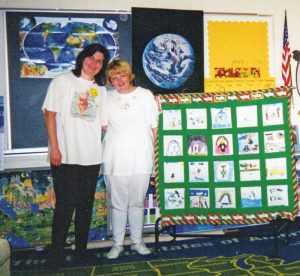

Tami Lavitt with Cindy McPherson stand by a quilt that Tami made from students’ drawings to celebrate their love for their teacher who was in love with penguins
A Teacher’s challenge can be a privilege, memories of Mrs. Cindy McPherson by Tami Graham
Tiara’s favorite teacher, Mrs. McPherson, decided to teach tolerance of diversity to her first-grade class at Wayne Thomas Elementary school after she adopted a little boy into her own family. This lesson opened a new topic for discussion, and my own daughter, Tiara, was able to share her frustration with not knowing her complete genetic lineage due to adoption.
“Love made you who you are, dear Tiara,” Mrs. McPherson had softly said. “We love who you are and it doesn’t matter where you came from.”
I often volunteered in that classroom just to be a “fly on the wall,” hearing some amazing conversations and witnessing some truly poignant moments. Mrs. McPherson often read wonderful stories to her class about all kinds of families and some of my daughter’s favorites were A Mother for Choco by Keiko Kasza, and Tell Me Again About The Night I Was Born by Jamie Lee Curtis. This teacher embraced differences and savored the children’s insight during discussions after reading each book. The children thrived in her class and knew that they mattered. It was a safe place to talk about their feelings and really listen to each other.
Mrs. McPherson loved to do creative projects, and I was ready and willing to lend a hand whenever she needed a parent volunteer. The class made family trees using colorful construction paper leaves to represent the children and their family members. This was a traditional fall project that she did and the results were awe-inspiring. Not only were the leaves gorgeous and the trees empowering, but they also offered a chance to talk about many different kinds of family structure. They discussed how amazing it is for a mom or dad to make a choice to embrace another little soul as their very own. It wasn’t a structured tree, like the typical family tree. Mrs. McPherson used to talk about how the root systems stretch far and wide and touched many other trees in the forest. She told us that trees can grow in family circles with the branches of neighboring trees bending and reaching to embrace each other.
She continued with her analogy assuring the kids that this makes their real family tree stronger. She used this time to discuss adoption, step parenting, foster care, divorce and the loss of loved ones. I will never forget the sweet stories these kids felt so comfortable sharing and the impact this open and honest “round table” discussion had on my own parenting. It was Mrs. McPherson who had touched that place in my heart where I had unknowingly held the space of my mother’s own feelings of being unwanted. She healed my inner child in ways that I am still very grateful for.
One life is connected to so many others. Remember your roots and embrace your neighbors; listen to every voice as if it is the most beautiful one you have ever heard.
Comment Policy: All viewpoints are welcome, but comments should remain relevant. Personal attacks, profanity, and aggressive behavior are not allowed. No spam, advertising, or promoting of products/services. Please, only use your real name and limit the amount of links submitted in your comment.
You Might Also Like...
Foster Care & Adoption
There are disadvantaged children and youth in our Upper California community that need the help of loving and supportive families. Thousands of children in the state are waiting for adoptive […]
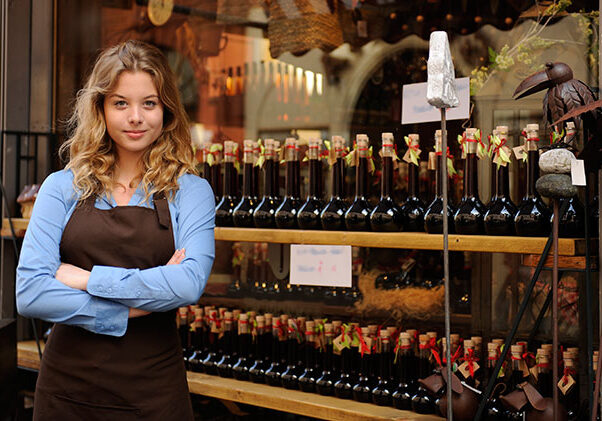
Taking the Leap – Women-Owned Small Businesses on the Rise
Most working women have thought about it: What would it be like to work for yourself? To be the boss and run the show? So you have a great idea […]
The Juggle is Real – Tips, Stories and Resources to Encourage Moms How to Start and Grow a Business
To be both a mother and a successful business owner is a dream of many women and a reality for a few. Is it possible to have a functional, loving […]
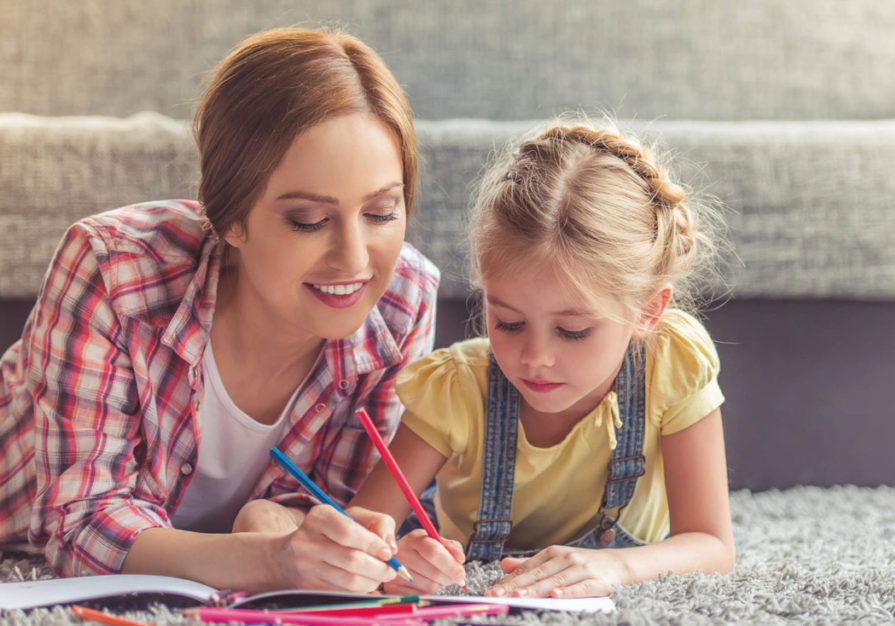
Exploring Learning Styles
A More Adventurous Approach to Education to Enrich Your Child’s Life as Well as Your Own School should be an adventure in learning, and so should life. But if you […]

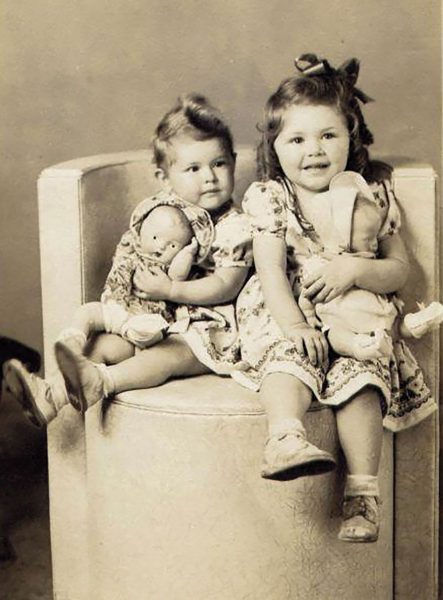
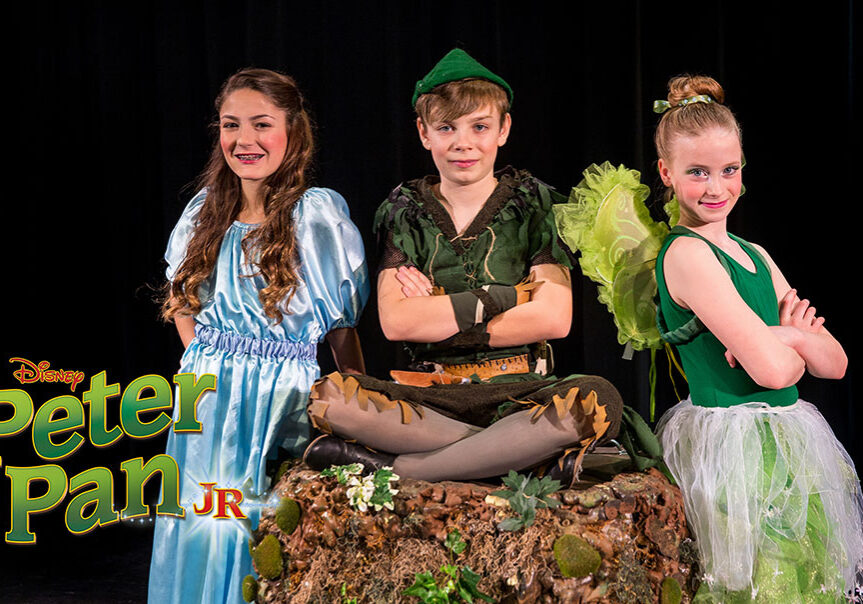
Lovely and touching article on a sensitive subject. I really enjoyed reading it.